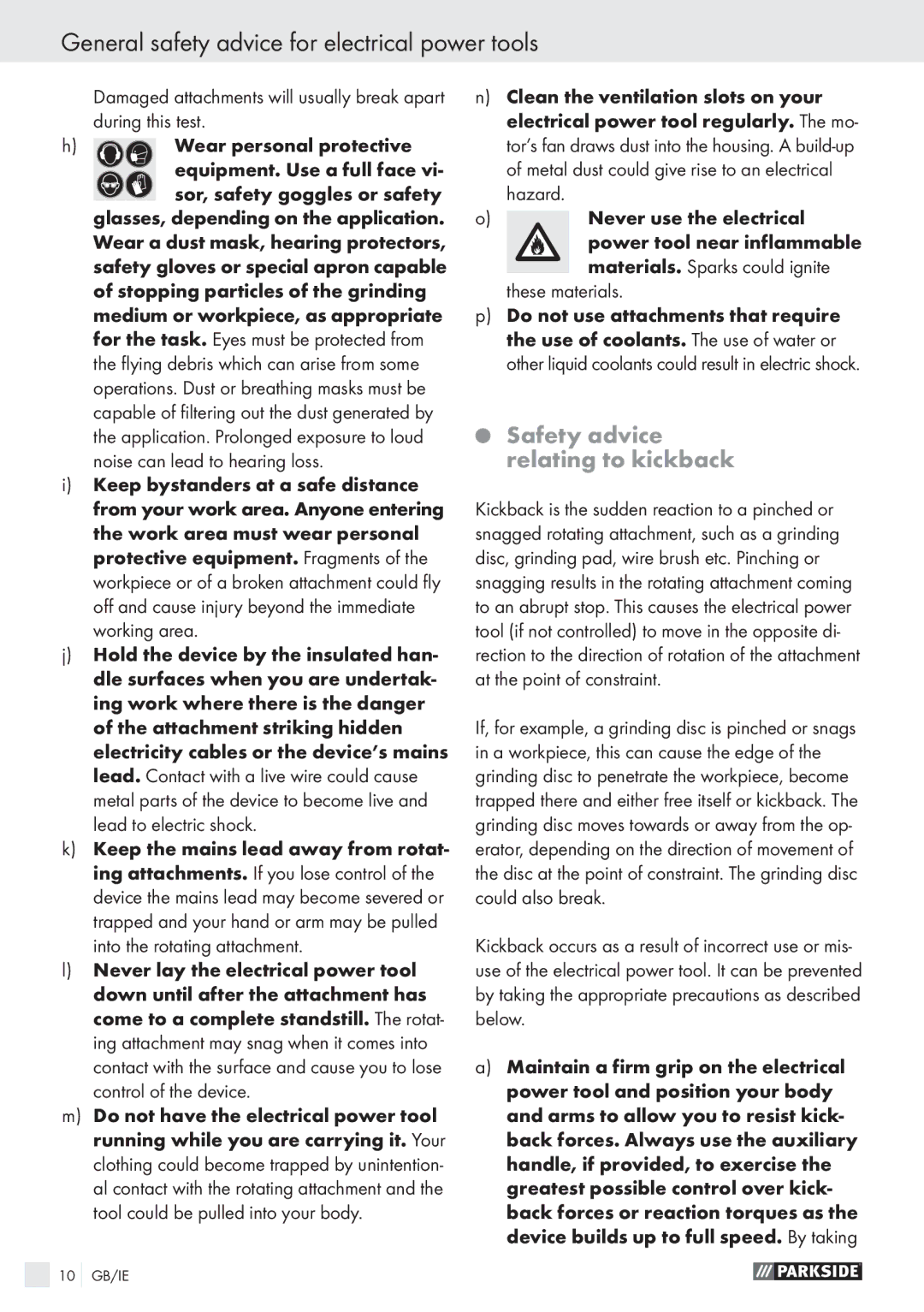
General safety advice for electrical power tools
Damaged attachments will usually break apart during this test.
h)Wear personal protective equipment. Use a full face vi-
![]() sor, safety goggles or safety glasses, depending on the application. Wear a dust mask, hearing protectors, safety gloves or special apron capable of stopping particles of the grinding medium or workpiece, as appropriate for the task. Eyes must be protected from the flying debris which can arise from some operations. Dust or breathing masks must be capable of filtering out the dust generated by the application. Prolonged exposure to loud noise can lead to hearing loss.
sor, safety goggles or safety glasses, depending on the application. Wear a dust mask, hearing protectors, safety gloves or special apron capable of stopping particles of the grinding medium or workpiece, as appropriate for the task. Eyes must be protected from the flying debris which can arise from some operations. Dust or breathing masks must be capable of filtering out the dust generated by the application. Prolonged exposure to loud noise can lead to hearing loss.
i)Keep bystanders at a safe distance from your work area. Anyone entering the work area must wear personal protective equipment. Fragments of the workpiece or of a broken attachment could fly off and cause injury beyond the immediate working area.
j)Hold the device by the insulated han- dle surfaces when you are undertak- ing work where there is the danger of the attachment striking hidden electricity cables or the device’s mains lead. Contact with a live wire could cause metal parts of the device to become live and lead to electric shock.
k)Keep the mains lead away from rotat- ing attachments. If you lose control of the device the mains lead may become severed or trapped and your hand or arm may be pulled into the rotating attachment.
l)Never lay the electrical power tool down until after the attachment has come to a complete standstill. The rotat- ing attachment may snag when it comes into contact with the surface and cause you to lose control of the device.
m)Do not have the electrical power tool running while you are carrying it. Your clothing could become trapped by unintention- al contact with the rotating attachment and the tool could be pulled into your body.
n)Clean the ventilation slots on your electrical power tool regularly. The mo- tor’s fan draws dust into the housing. A
o)Never use the electrical
power tool near inflammable materials. Sparks could ignite
these materials.
p)Do not use attachments that require the use of coolants. The use of water or other liquid coolants could result in electric shock.
Safety advice relating to kickback
Kickback is the sudden reaction to a pinched or snagged rotating attachment, such as a grinding disc, grinding pad, wire brush etc. Pinching or snagging results in the rotating attachment coming to an abrupt stop. This causes the electrical power tool (if not controlled) to move in the opposite di- rection to the direction of rotation of the attachment at the point of constraint.
If, for example, a grinding disc is pinched or snags in a workpiece, this can cause the edge of the grinding disc to penetrate the workpiece, become trapped there and either free itself or kickback. The grinding disc moves towards or away from the op- erator, depending on the direction of movement of the disc at the point of constraint. The grinding disc could also break.
Kickback occurs as a result of incorrect use or mis- use of the electrical power tool. It can be prevented by taking the appropriate precautions as described below.
a)Maintain a firm grip on the electrical power tool and position your body and arms to allow you to resist kick- back forces. Always use the auxiliary handle, if provided, to exercise the greatest possible control over kick- back forces or reaction torques as the device builds up to full speed. By taking
10
GB/IE
